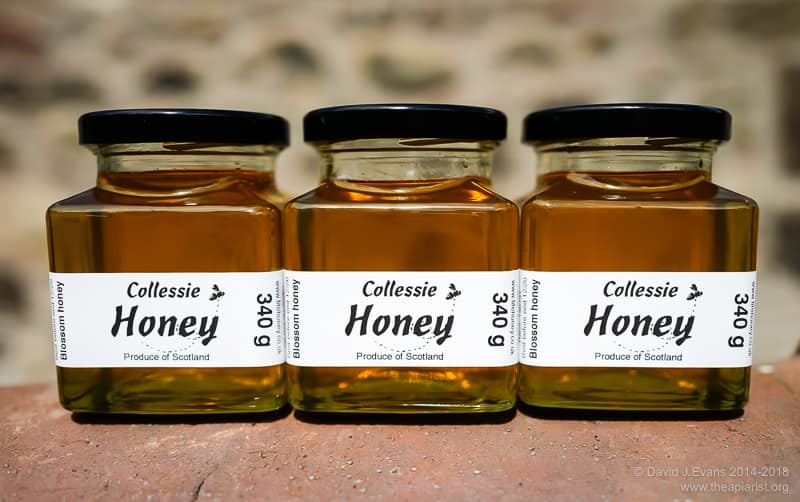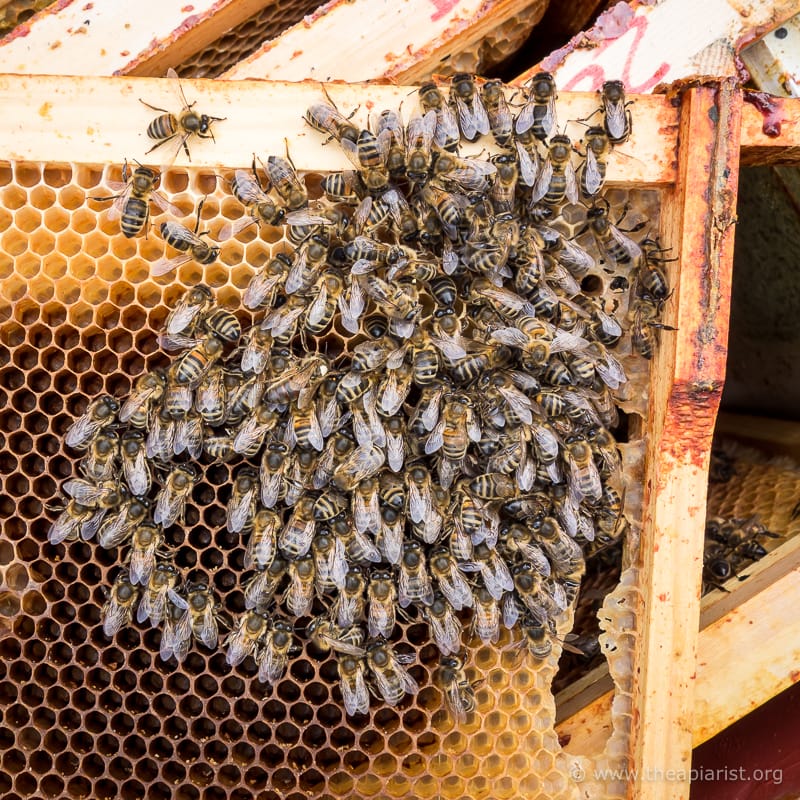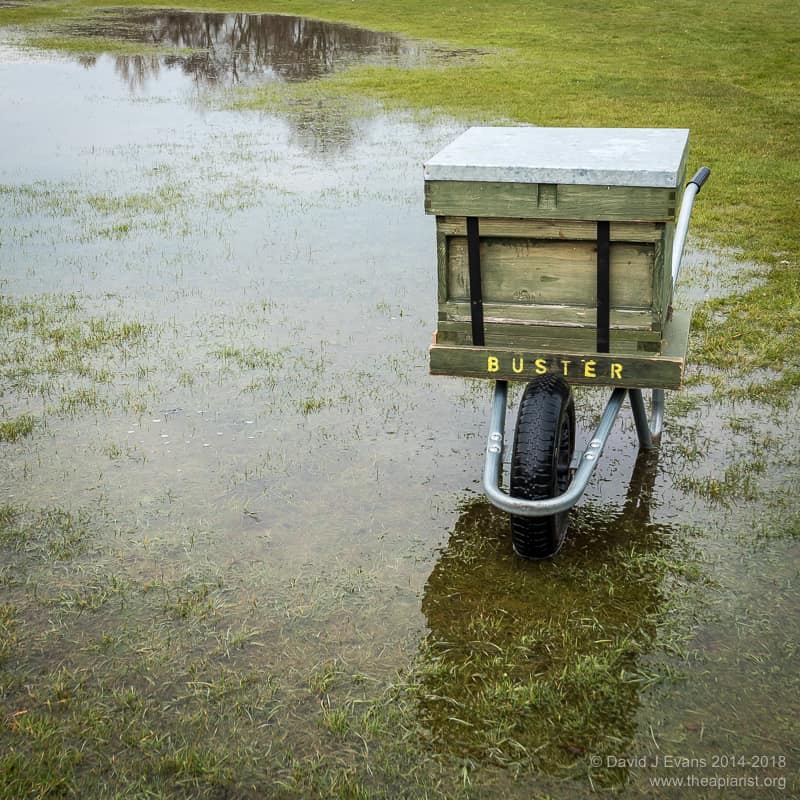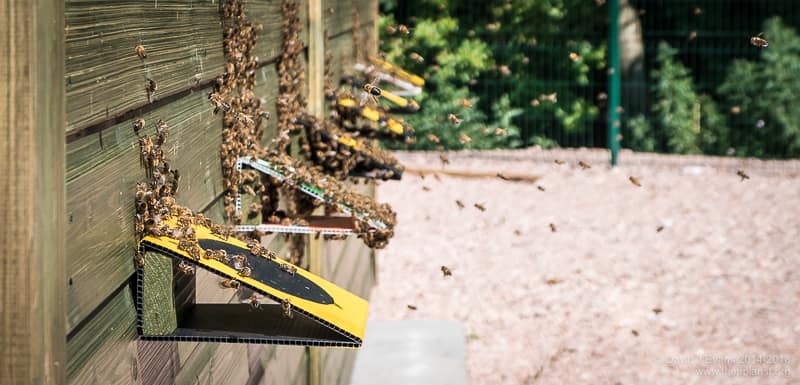Why keep bees
Synopsis : What makes people want to start beekeeping? Is it to Save the bees, or because they just like honey? Is their persistence and long-term success influenced by their initial motivation to keep bees. Do they keep beekeeping for the same reasons they start beekeeping?
Introduction
Hundreds of potential new beekeepers, spread across the country, are now enrolled on ’Beekeeping for beginners’ or ’Start beekeeping’ events. In the next few weeks they will take weekly or weekend theory courses.
Life cycle, swarming, the hive, Varroa, foulbroods, candles, honey … the whole nine yards {{1}}.
They will read and re-read every page in the Thorne’s catalogue until they can recite it verbatim.
If they’re sensible they will not ’splash the cash’ until they can discriminate between what they actually need, what they might want (but not need), and what will be a total waste of money {{2}}.
With luck, and a responsible beekeeping association, they will be appointed a mentor to provide help, advice, reassurance, cups of tea, a starter nucleus of bees, cake, commiserations and/or antihistamines {{3}}.
It’s an exciting time. There’s a lot to learn {{4}} and so every reason to be a little apprehensive.
And, if they’re not, perhaps they should be?
In April they should get to see inside a hive.
Will they experience the same heady combination of wonder and bewilderment that I still sometimes feel when lifting a crownboard?
For some it will be a truly life-changing experience 🙂
For others it will confirm that they should have never taken the course in the first place 🙁
But for most it will be something in between.
I’ve often wondered whether the reaction during these early apiary sessions, and the subsequent beekeeping progress, is related to their original motivation to keep bees.
In the beginning
I don’t remember why I was interested in beekeeping. Other than my grandmother, there was no history of beekeeping in my family, and I don’t think my gran kept bees for many years.
I have a faint memory of a couple of lovely WBC hives on a patch of grass overlooking the valley, but never discussed them with her or did anything other than watch the bees going in and out.
When I signed up for a ’Start beekeeping’ course I knew less than nothing about beekeeping or beehives. I didn’t know about removable frames, or supers, or anything about plants or nectar or forage {{5}}.
In fact, I didn’t have a Scooby Doo what was actually inside a beehive, other than a heck of a lot of bees.
However, I was interested in bees.
With a background and education in biology and employment as a biologist {{6}} I was always fascinated by living things. I’d read Konrad Lorenz and some other books on animal behaviour, I knew a bit about communication in higher animals and I’d heard – and probably been taught the rudiments of – the waggle dance.
I also had a sweet tooth and a long history of starting things enthusiastically and then – over time – moving on to something else. There’s nothing wrong with this approach to life/hobbies/jobs {{7}} though it can get rather expensive if those interests are sports cars or yachts.
As it turns out … it can also get quite expensive if your interests are bees 🙁
Save the bees, save humanity
I started keeping bees well over a decade ago {{8}}. This was a long time before the marketing departments and rent-a-hive greenwashers had realised that there was serious money in honey bees.
Not in beefarming per se but in using honey bees as a sort of environmental imprimatur. If a product states it is bee friendly, or has ’Save the bees’ stamped on it, sales will increase.
Or it will sell at a higher price … or both.
Assuming the (inevitable) illustration used to decorate the product is recognisable, it will probably be a honey bee.
Equally inevitably, this constant reinforcement means that the public {{9}} start to believe that honey bees are threatened and that their numbers are declining.
The reality of course is that honey bee numbers are actually increasing (globally, though not necessarily in all countries), and have been for at least the last 50 years. That doesn’t mean they’re not threatened {{10}} … but they’re hardly in imminent danger of disappearing.
But at least some decide that the best way to ‘Save the bees’ would be to start beekeeping.
That wasn’t what made me want to start, but I know it’s motivation for some.
Responsible beekeeping associations should stress the potential impact competition from honey bees may have on wild pollinators … those who take up beekeeping to ’Save the bees’ may be doing precisely the opposite.
And those who start and then abandon their bees, leaving hives containing Varroa-ridden colonies to re-infest the neighbourhood, are definitely not Saving the bees … or humanity.
Self sufficiency
Beekeeping often appeals to people who want to be at least vaguely self-sufficient … in much the same way as keeping chickens or growing carrots does. Subconsciously, this may well have been the driver that encouraged me to sign up for a winter course on keeping bees.
I’d always wanted to keep chickens and had already failed spectacularly at growing carrots {{11}}.
My attempts at allotment self-sufficiency had been marred by copious amounts of ground elder, a prolonged drought and frequent overseas travel. Surely beekeeping would be less time-consuming?
I’m beginning to realise it isn’t 😉
But the great thing about beekeeping is that – with a bit of effort – you can do better than achieve self-sufficiency.
I’ve been self-sufficient in honey since my first summer. Unless you eat vast amounts of the stuff it would be difficult not to be.
But the great thing about honey is that it’s a highly valued {{12}} product, with a long shelf-life.
Not unlike gold … liquid gold.
And, like gold, other people value it.
Gifts for dinner parties, thank-yous for the loan of a log splitter, even payment for odd jobs. I’ve used honey for all these things in the last couple of months.
A surplus of honey also opens up a wonderful world of barter and exchange. A jar of honey for some fresh eggs, or to help reduce the glut of runner beans or carrots, is both enriching and saves me the grief of digging and watering an allotment.
Not only is this a compelling reason to start beekeeping, it also means you get to meet like-minded people who are actually good at keeping chickens or growing carrots, and they are almost always interesting to chat with.
Profit
Are you mad?
I’m sure many amateur beekeepers think they make (at least some) money from their bees, and some probably do.
But they are beekeepers, not accountants {{13}}.
Have they factored in the outgoings as well as the income? The cost of their time, the petrol for the van, the ongoing costs of frames and foundation and Apivar?
The losses, the bad years, the bad back?
Over my (relatively short) beekeeping career only about one year in four provides a real bonanza of honey. In the years you don’t run out of supers and honey buckets, you still have the same effort and outgoings. Or possibly more of both.
Even taking these things into account, I’m sure it’s possible to make some money … but would it be enough to live on?
I’ve discussed my back-of-an-envelope attempt at determining the economics of amateur beekeeping. I don’t claim it’s close to accurate, but it does give an idea of just how little ‘profit’ might be made per hive in a poor year, or conversely, how many hives you’d have to run to make more than the state pension.
I’m sure there are a few {{14}} individuals who take a ’Start beekeeping’ course with the dream of making a good living from bee farming.
I suspect rather few achieve their ambition 🙁
And one of the reasons it’s unlikely to be achieved is that beekeeping – at least beekeeping well – is difficult. It might seem easy in principle, or in a book (or from a website 😉 ), or during a ‘Start beekeeping’ course, but in practice it can seem like an intractable combination of art, science and witchcraft.
Why I keep bees now
Which explains at least part of my ongoing fascination with bees and beekeeping.
There is always something more to learn.
I’ve written before that there is rarely, if ever, a trip to the apiary that does not result in me learning something new. Or learning that my current understanding of some aspect of beekeeping is inadequate, and that there is therefore more to know.
Which, of course, is half the trick about learning … if you realise what you don’t know, you’ll be alert for an opportunity to fill the gap(s) in your knowledge.
And part of the reason there’s so much to learn is that every season is different.
The weather varies; cold springs, hard winters, wet summers … all change the times that nectars and pollens are available, so influencing colony development.
Or the farmers get less subsidy for cattle feed and more for biofuel, so they abandon growing field beans and start growing more oil seed rape.
Our colonies respond by swarming earlier, or later, or (typically) at the time we’re least expecting.
Keeping bees means I am more in tune with the rhythm of the seasons.
I’m more aware of the arrival and departure of migrant birds, the flowering of trees or when the mackerel shoals appear in the loch. Most of this is subconscious, assisted by a little bit of note taking in my hive records.
April 10 : Colony #21 Q #7 : Gorse and late willow pollen, 5+ frames BIAS {{15}}, first cuckoo of the season
All of which is actually rather nice. You become acutely aware of the environment around you. This provides an invaluable ‘grounding’ if your weekly existence usually involves shuttling between an air conditioned office and an air conditioned car {{16}}.
Zen and the science of honey bees
I’ve worked on the biology of honey bee viruses for over a decade. The ability to mix ‘work and (p)leisure’ has been great. I’m certain that being a beekeeper has enabled me to write more successful funding applications {{17}}.
My beekeeping has certainly helped my scientific interactions with other beekeepers … the many individuals and associations I’ve scrounged samples from, or who have acted as ‘guinea pigs’ for my PhD student’s projects.
One of the good things about the science of honey bees is that there are some excellent communicators on the subject. Thomas Seeley and Mark Winston are well worth reading, and if you have a subscription to American Bee Journal you can also read Jamie Ellis, Randy Oliver and Wyatt Mangum.
And there are many others.
An understanding of the biology or behaviour of bees can help you understand the science.
Lakes, for example … bees don’t like flying long distances over expanses of water. In fact, if they try to they often crash land in the water and perish. I’ve discussed optic flow and distance measurement by bees in a previous post. The mirror-like lake provides insufficient visual clues crossing their retinas, causing them to fly closer (and closer) to the surface to help estimate speed and distance … and take an early bath.
On a more practical level, the need for regular samples of larvae and pupae for research prompted me to investigate, and eventually build, a bee shed (or three).
These have been a revelation for many aspects of beekeeping, and are particularly useful in areas with unpredictable weather, or for beekeepers who only have limited time each week for their bees.
My most recently completed shed has still to accommodate any hives, but will be used for queen rearing in the, er, ’changeable’ climate I now enjoy on the west coast of Scotland.
I didn’t even know that queen rearing was a ‘thing’ when I started beekeeping, but it now brings me more enjoyment than many other aspects of the hobby.
Everyone is interested in bees
Finally, and this might be a byproduct of the ‘Save the bees, save humanity’ marketing hype you see in the supermarket or read in the newspaper, lots of non-beekeepers are interested in bees.
When I used to live in a small village and sell honey ‘from the door’ it would sometimes involve a 45 minute conversation to sell a half pound jar.
My honey sales were earning me less than the national minimum wage 🙁
“Where are your hives? What sort of nectar do they collect? Do they fly far? Is it true that honey is antibacterial? Have you a recipe for thin syrup? {{18}} Why are honey bees threatened?”
Which brings me almost full circle to the start of this rambling discourse …
And, of course, the other question beekeepers are regularly asked is “Do you get stung a lot?”
You can play it cool and discuss the rigorous selection criteria you’ve used to produce the benign, laid back, mellow colonies of bees in your hives.
Or you can lay it on thick and make it sound akin to alligator wrestling … in a veil.
You’ll need to judge the customer to work out which is more likely to generate additional sales.
I now cannot imagine not keeping bees, even though I’m not entirely sure why I started in the first place. They are an integral part of my life, though they are by no means my only pastime/hobby/obsession.
The rhythm of the seasons means that my beekeeping is ever-changing; colony expansion in the spring, queen rearing, the honey harvest, talks, feeding them up for winter, DIY projects, more talks, jarring honey and then starting all over again.
If it was the same thing, week in, week out, I’d have probably given up years ago and kept chickens instead.
{{1}}: An idiom that dates back to the mid-19th Century though its etymology is, at best, unclear.
{{2}}: If it pleases the court m’lud … I present exhibit one, the combined hive tool, brush and sugar duster.
{{3}}: And, quite possibly, all of those during the first season … or even one calamitous afternoon in the apiary.
{{4}}: And it won’t be for another decade at least that they will realise they can never know it all.
{{5}}: Even now I’m a bit sketchy on some of these things.
{{6}}: Admittedly in a rather obscure corner of the discipline, at least until Covid arrived.
{{7}}: Actually, other than spouses (where it tends to be frowned upon and/or financially ruinous), it actually makes for a pretty interesting existence.
{{8}}: This sentence needs a comma, somewhere near ‘well’ … take your pick where to place it.
{{9}}: Which is what beekeepers are before they become beekeepers.
{{10}}: They are … by Varroa, viruses, agricultural chemicals, environmental degradation and lousy beekeepers.
{{11}}: Though a combination of neglect and a hot summer produced a bumper crop of onions.
{{12}}: At least by discerning, intelligent and good looking individuals.
{{13}}: Can any beekeepers who are also accountants confirm my prediction that an actual profit is unlikely for many amateur apiarists?
{{14}}: Delusional?
{{15}}: Brood in all stages = eggs, larvae and pupae.
{{16}}: Or Zoom meetings … and Zoom meetings.
{{17}}: At least on bee viruses … I’m less certain it has benefited my applications on some of the more esoteric aspects of virus evolution.
{{18}}: OK, the last one isn’t a typical question, but regular readers will recognise it.






Join the discussion ...